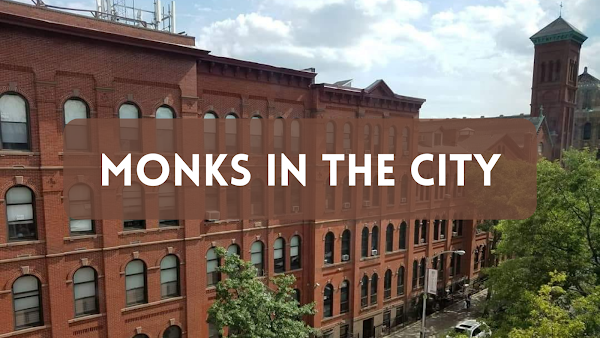By Br. Bruno Mello, nO.S.B.
The stained glass windows were still blackened by night as I took my seat in the monastic choir this morning. The stillness of the morning was broken only by the silent flickering of candles lining the nave of the church. Soon there was a shuffle of rising bodies, first one, then another, until all 19 monks and novices were standing. Waiting for a trembling voice to ring out in a haunting melody:
Arise O Lord! And save me, my God!
This psalm, Psalm 3, is one of my favorite little things about life in the monastery. It’s the loon’s call of invitatory psalms: chilling, unforgettable, unsettling. There’s an urgency to this psalm that is shocking - it’s a prayer prayed by one surrounded by foes, in dire straits, yet prayed with utter and complete trust in the Lord.
I think one of the reasons I like Psalm 3 so much is because my heart is always in the prayer. There’s never a time when I think “I don’t really need God to save me today.” I know well that I constantly need His saving power, so at any given moment, I can pray the words of Psalm 3 and really mean them.
That’s not the case with every psalm.
It is a custom of Benedictines to pray every word of every psalm during Divine Office. This means that we even pray the imprecatory psalms (aka the cursing psalms), certain psalms that have are normally censored or omitted during worship because of the “psychological difficulty” of praying them. The cursing psalms often involve desperate cries of anguish and prayers that God punish one’s oppressors. They are graphic, disturbing, and understandably omitted, as they are indeed very difficult to pray.
When I was a postulant I really struggled with praying the cursing psalms. I’m a generally good-natured man, and though I don’t get along with everyone, very rarely do I want to smash the teeth in their mouths and I certainly have never wished that his children be fatherless orphans. It’s very difficult to speak words such as these as a prayer, when I myself do not want to pray for such things.
Why do we pray such psalms? One reason is because these Psalms carry more than a literal meaning. We don’t pray for the destruction of Babylonians or Assyrians anymore, rather, we pray for the destruction of evil wherever it is found today. Who doesn’t want to see a massive hurricane dissolve like a snail or see cancer perish in disgrace? With a healthy Christian anthropology, we can recognize that human beings - ALL human beings - are created good and the evil they do is a distortion of their true nature. Thus we can pray these cursing psalms with a clear conscience, asking God to remove and destroy the evil in our midst.
Another, maybe even more important, reason we pray the cursing psalms is on behalf of those who cannot pray. Imagine the utter anguish of someone who is so hurt that they want to drop burning coals on the people who hurt them. What unbearable pain must someone be in to praise as blessed the person who murders their enemies’ children? If someone felt this overwhelming hurt and despair three thousand years ago when they wrote a psalm about it, you can be sure that there is someone today who is in just as much torment.
I think we’ve all been at a point in our lives when we are too angry, or too sad, or too discouraged to pray. The cursing psalms take that feeling to an extreme level. But who can pray for those who are in such terrible pain? Who can give voice to their cries of despair and anguish? Monks. That’s who. As unpleasant as it may be, expressing ourselves honestly to God is part of a healthy spiritual life. And when one is in too much pain to pray, it is our job to pray on their behalf.
Part of our job as monks is to pray for the world. Normally, when we say, “I’ll pray for you” we mean, “I’ll pray about you.” But when it comes to prayer in the monastic choir, “I’ll pray for you” means “I’ll pray in your place.
I’ll give voice to your grievances. I’ll offer from my own lips the sorrows of your heart. I’ll pray for you when you can’t pray.”
Which brings us back to Psalm 3. While not a cursing psalm, we normally pray Psalm 3 every Friday morning. But today is not Friday. Today is All Souls' Day - the day in which all Christians are encouraged to pray for our deceased relatives and friends. And on All Souls Day we pray the Office of the Dead - a certain set of psalms and readings offered for those deceased.
According to Catholic teaching, the dead cannot pray for themselves. At the moment of our death, our final destination is determined: Heaven or Hell. At each and every moment of our lives, we can, by God’s grace, choose Heaven for all eternity. When we die, that choice is set and we can do nothing more to help ourselves.
This means that the Holy Souls in Purgatory, who are bound for Heaven after their purification, cannot pray for themselves (Fr. Mike Schmitz does a good job of explaining what Purgatory is in this video: https://youtu.be/GnwDDsN6ZfM). Much like those suffering here on Earth though, the souls in Purgatory can be aided by the intercession of others.
Thus the importance of praying for the dead is the same as the importance of praying the cursing psalms: we should pray for those who cannot pray for themselves.
This connection hit me rather quickly as I began praying the Office of the Dead this morning and I immediately thought of my grandmother, who passed away almost 2 years ago. I think of her quite often and had already decided to pray “for” her on this All Souls' Day, but as I sat in choir, I decided to pray “in her place.” No longer where my words my own, but I offered them to God, asking Him to receive them as my grandmother’s:
“Come,” my heart says, “seek His face!” It is Your face O Lord that I seek, do not hide Your face from me.
Consider my affliction and my trouble, and forgive all my sins.
Do not, O Lord, withhold Your mercy from me; let Your steadfast love and Your faithfulness keep me safe forever.
But I trusted in Your steadfast love; my heart shall rejoice in Your salvation. I will sing to the Lord, because He has dealt bountifully with me.
As for me, I shall behold Your face in righteousness; when I awake I shall be filled with the joy of Your presence.
How different my prayer became! The urgency of my prayer increased as my words were no longer my own but words offered on behalf of another. Although I don’t know for sure where my Grammie is right now, but I hope and I pray and I trust that she is with the Lord. And I will continue to pray for her until, one day, God willing, we are reunited in Heaven.
If we can pray words of cursing to bring to light the anguish and pain suffered by so many, I believe that we should pray words of hope and trust to give voice to the holy longings of our deceased loved ones. May the Lord accept my prayer offered for my grandmother and may he accept all the prayers offered for the dead.
May her soul and the souls of all the faithful departed, through the mercy of God, rest in peace. Amen.






Thanks you. I have had a similar experience of praying the psalms.
ReplyDeleteThe ordination rite of deacons here in Latin America has a slightly different wording for the promise to pray the Liturgy of the Hours. We are called to pray the psalms “in the name of the Church and, even more so, in the name of the whole community.”
The night of my ordination I went to pray Vespers in my prayer room and as I prayed I had a deep sense of praying in the name of the church and the world. I found myself able to pray the psalms of a person in need, even though I did not personally feel the pain of that person - because I was praying with him, in his name or, as you well put it praying for those who cannot pray for themselves, putting myself in their place. Likewise, when I feel regret for my sinfulness, it's hard to pray the psalms that proclaim that I have been faithful; but then I find myself praying in the name of those who are faithful.
Maybe it's just a nuance, but praying "in the name of" others is, for me, very different than praying "for" them. We are together in this mess - and in the joys of the Lord.